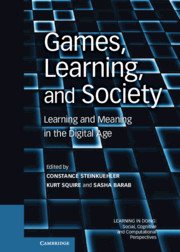Book contents
- Frontmatter
- Contents
- Contributors
- Series Foreword
- Foreword
- Acknowledgments
- Section I Games as Designed Experience
- Section II Games as Emergent Culture
- Section III Games as Twenty-First-Century Curriculum
- 17 Introduction to Section III
- 18 Prediction and Explanation as Design Mechanics in Conceptually Integrated Digital Games to Help Players Articulate the Tacit Understandings They Build through Game Play
- 19 Game-Based Curricula, Personal Engagement, and the Modern Prometheus Design Project
- 20 Discovering Familiar Places
- 21 Developing Gaming Fluencies with Scratch
- 22 “Freakin’ Hard”
- 23 Models of Situated Action
- Afterword Games and the Future of Education Research
- Index
- References
23 - Models of Situated Action
Computer Games and the Problem of Transfer
Published online by Cambridge University Press: 05 August 2012
- Frontmatter
- Contents
- Contributors
- Series Foreword
- Foreword
- Acknowledgments
- Section I Games as Designed Experience
- Section II Games as Emergent Culture
- Section III Games as Twenty-First-Century Curriculum
- 17 Introduction to Section III
- 18 Prediction and Explanation as Design Mechanics in Conceptually Integrated Digital Games to Help Players Articulate the Tacit Understandings They Build through Game Play
- 19 Game-Based Curricula, Personal Engagement, and the Modern Prometheus Design Project
- 20 Discovering Familiar Places
- 21 Developing Gaming Fluencies with Scratch
- 22 “Freakin’ Hard”
- 23 Models of Situated Action
- Afterword Games and the Future of Education Research
- Index
- References
Summary
Any discussion of games and learning has to address a fundamental question: How do we know that players aren’t just learning how to play the game? That is, how do we know that what they do in the game will help them do other things in the world around them, the world outside the game?
Answering such questions forces one to come dangerously close to – indeed, to step right on – the third rail in the study of learning today: the problem of transfer. No term, no word, no concept is as problematic, as debated, or as contentious. Schema theorists say that it is essential, sociocultural theorists say that it doesn’t exist, and never the twain shall meet, it seems. Debates are held in scholarly journals (see, for example, Anderson, Reder, & Simon, 1996; Greeno, 1997; Hutchins, 2008; Packer, 2001; Seel, 2001). Graduate students and junior faculty avoid the term, knowing that where you stand on transfer determines where you sit in the field, and whatever you say will cast you in a dubious light somewhere.
But the problem of transfer is unavoidable in a field that examines the conditions under which and the processes by which people learn. As Dewey (1938) points out: “Every experience inlfuences in some degree the objective conditions under which further experiences are had” (p. 37). A key question for the design of games for learning has to be: “What are the mechanisms by which one experience inl uences another?” The premise of education writ large is that it is possible for experience to transfer – in this general sense – from one context to another. Otherwise, there is no education, in games, in school, or anywhere. There is no learning.
- Type
- Chapter
- Information
- Games, Learning, and SocietyLearning and Meaning in the Digital Age, pp. 403 - 432Publisher: Cambridge University PressPrint publication year: 2012
References
- 24
- Cited by



